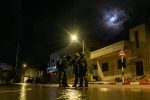The closure this week of all bakeries in Gaza sets the stage for another devastating wave of starvation across the besieged territory.
Paper signs now hang in bakeries, reading “closed until further notice”. The long lines of people who would typically be queuing outside have disappeared.
In Gaza, bakeries are not just places where bread is made and bought. They are lifelines for the Palestinian people amid Israel’s brutal war and siege – a source of sustenance and survival.
Flour, once an easily accessible commodity, is now rare, with the World Food Program, which supports 18 bakeries in Gaza, saying its warehouses have run out.
The concerns of Gaza’s population of more than two million people are growing by the hour. Even those who might still have baking supplies at home are running out of options, because the gas required to operate ovens is increasingly scarce.
In addition, many people who were forced by Israel to flee their homes in the north, were unable to take any belongings with them. Many now live in tents and cannot afford the high prices of food in Gaza’s markets.
A day after the bakeries shut down, the price of a bag of flour in the markets ranged from around 100-500 shekels ($27-$135). Anyone who still has flour must cook over an open wood fire, due to the lack of gas.
Cascading health impacts
In Gaza, bread is an essential part of daily life. It is consumed at almost every meal, and many families rely on bakeries for their daily bread, traditionally sold at subsidized prices.
Most of us have now reached the “one meal a day” stage. We rely primarily on canned food, rice, pasta or soup.
The last time we faced imminent starvation during Israel’s war, which has continued now for a year and a half, we had been baking bread three or four times a month before the flour ran out. We then reached a point where we were eating cheese and zaatar on their own, with a spoon.
Malnutrition has become a serious problem across Gaza, affecting thousands of children who require a proper diet in order to grow and thrive.
The threat of starvation is no longer a distant concern, but an immediate danger that could cause long-term health problems for many Palestinians. Children and the elderly are at particular risk.
The spiraling hunger crisis comes as medical facilities in Gaza have been decimated. The cascading health impacts of the territory’s growing starvation crisis will significantly strain the already overburdened system, leading to preventable deaths. Starvation will further weaken the population, leaving people more vulnerable to illness and disease.
Flour has always been central to life in Gaza. I remember watching fights break out as people scrambled to grab what they could from aid trucks, desperately trying to obtain just a single bag of flour to feed their families.
During the infamous Flour Massacre last year, more than 100 Palestinians were killed and hundreds of others were wounded as Israeli forces opened fire on people queuing for aid in Gaza City.
Later in the year, horrific images emerged of blood mixed with flour after Israeli forces killed several Palestinians seeking supplies in a “humanitarian zone”. It was a reminder that our struggles for basic necessities may continue until our last breaths.
Amid the closure of bakeries and the looming threat of famine, Gaza is at a crossroads, facing an unprecedented humanitarian crisis. For Palestinians in Gaza, bread is survival, and without flour, our future is uncertain. Israel must open the border crossings now to allow the entry of desperately needed aid.
-Huda Skaik is an English literature student and writer from Gaza. She is a member of We Are Not Numbers, and a contributor for The New Arab, The Electronic Intifada, and the Washington Report on Middle East Affairs. Her article appeared in the Middle East Eye.












